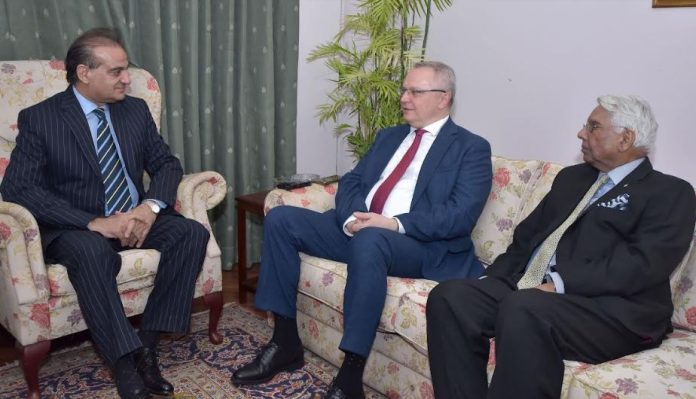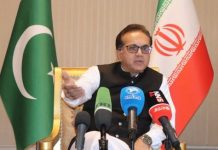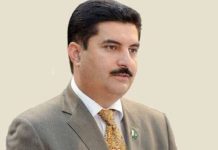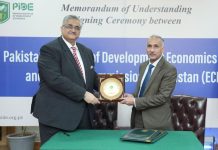Mr. Egidijus Meilunas, Vice Minister, Ministry of Foreign Affairs of Lithuania visited Pakistan in the third week of May 2024. During the visit the Minister held important meetings with the high-level Pakistani officials. The Minister also attended the reception hosted by Hon. Consul General of Lithuania in Pakistan Masood Khan. The Vice Minister talked to Daily Islamabad POST, Centreline magazine and Diplomatic News Agency (DNA). Here are excerpts from his interview.
Ansar Mahmood Bhatti
People to People contacts
Enhancing interpersonal connections undeniably serves as a cornerstone in fostering stronger bilateral ties between nations. I’m delighted to convey to you that there’s a vibrant exchange of intellect and culture between Pakistan and Lithuania, exemplified by approximately 400 Pakistani students currently pursuing various academic disciplines in Lithuania. Among them, many are delving into the realms of technology and medicine, while others are exploring diverse fields of study. Notably, a cohort of Pakistani scholars is even engaged in doctoral research. It’s worth mentioning that Lithuanian universities actively recruit students from Pakistan, reflecting the mutual commitment to educational collaboration. Furthermore, the student body in Lithuania comprises individuals from various nationalities, adding richness and diversity to the academic milieu. This thriving exchange underscores the enduring bonds and shared aspirations between our two nations.
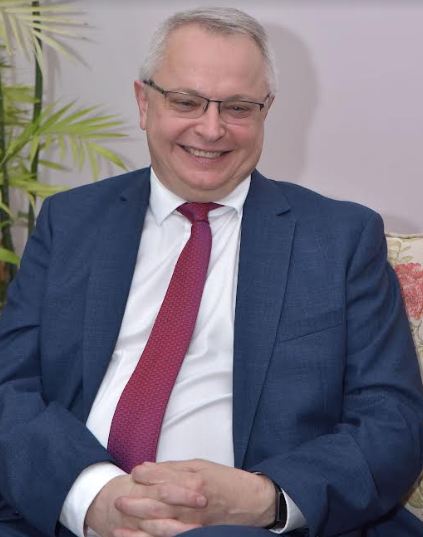
Tourism potential
Tourism is a burgeoning industry for us, yet one with immense potential. We aspire to warmly welcome tourists from Pakistan and beyond. However, achieving this vision necessitates a concerted effort to foster mutual understanding between Lithuania and Pakistan. Both governments must commit to tirelessly promoting awareness of the unique offerings, particularly within the tourism sector, that each country possesses. By collaborating closely and championing the cultural richness and natural beauty of both nations, we can pave the way for a flourishing tourism exchange that benefits all involved. Direct airlinks can contribute greatly towards promotion of people to people contacts and spurring the tourism activity on both sides.
Digital solutions
Lithuania is world leader in digital solutions, use of IT. Its key areas are: Life sciences including biotechnologies, ICT, digital solutions, new processes and new materials—in this category, we can give example of Lithuanian laser industry as Lithuania today produces more than 10pc of scientific lasers.
It is quite noteworthy that Pakistan is also investing in hi-tech sector, for example, in financial technologies (Fintech). Pakistani banks have made a significant progress in digitizing their systems and they might be interested in Lithuanian solutions.
Agriculture cooperation
This doesn’t mean that we start action right now. First step is exchange of information. Take example of agriculture, Lithuania is traditionally agriculture country with old practices for ages. Now, of course still it is an important sector but it’s only 3pc of our GDP which used to be 10pc some 30 years ago.
What we did: We modernized our agriculture sector to be more productive. Today, I presented to my Pakistani friends some solutions on biological fertilizers.
Traditionally, we used synthetic chemicals and fertilizers in agriculture which are quite effective but you need big quantity of them and they are not good for your health.
Some Lithuanian companies produced fertilizers based on organic solutions so they are not harmful for nature and for your health and importantly, you don’t need big quantity of them.
Trade relations
Last year our trade turnover was around Euros 50 million. It is not high but it has the potential to increase. Our exports are a little bit more than the imports from Pakistan but more or less they are balanced. We are keen for mutual investment from Pakistan to Lithuania and from our country to Pakistan.
Lithuanian gained independence 35 years ago. We faced challenges of transformation of political system, establishment of democracy, freedom, rule of law and also economic transformation. Under Soviet occupation, we had very ineffective economic system which was so-called centrally governed. Private initiative and private properties were not allowed. So, we had to create new economic system from a scratch.
We have successfully gone through this new system and our economy is very open, very stable and rapidly developing. 84pc of our GDP is created by exports and it is because we are very open globally.
Pakistan’s public and private sector— banks, businesses, enterprises and companies— can multiply their growth as well as revenues by entering into cooperation with their Lithuanian counterparts as the country is a world leader in cutting edge technologies such as development of business service centers, startup ecosystem, fintech, software development, cyber security, life sciences, engineering and electronics.
Hi-tech advancement
We have invested a lot in hi-tech sector. Biotechnologies alone create 3pc of our GDP that means 4-time more than EU average. Our goal is 5pc GDP by life sciences or biotechnologies.
We are specializing in this sector and last year we developed semiconductors in cooperation with Taiwan. We are going to build our first semi-conductor plant in 2029 and it would be one more hi-tech industry in Lithuania.
Traditional industries are also well-developed like chemical industry. We also have the biggest oil refinery in Baltic Sea region. We also produce petrol. Engineering industry is also doing well. Logistics and transport sector also create 10pc of our GDP. Small Lithuania has one of the biggest truck fleets in whole Europe. We serve as transportation hub in Europe.
Fast Train Project: We still have to improve connectivity in Europe. We have a very ambitious plan extending railway connection starting from Finland, then going through Estonia and Lithuania and then to Poland. This project is called ‘Rail Baltica’ going through five Baltic states.
ENERGY SECTOR
In energy, we are also going though energy transformation. We are building new capacity i.e. renewable sources two wind offshore farms in Baltic Sea and by 2030 we shall be able to produce more than 7Gigawatt electricity.
Currently, we are importing electricity but by 2030 we shall be exporting or selling it. Currently, renewable energy share in our grid is 40pc mainly generated from hydro, wind and solar (though solar’s share is less than the other two).
EDUCATION COOPERATION
A large number of Pakistani students, more than 400 are studying at various colleges and universities of Lithuania. Twenty of these students are doing their Ph.D.
Most popular discipline for Pakistani students is technical education. Majority of them are concentrated in Vilnius and Kaunas, two major cities of the country. The University of Vilnius established in 1579, is more than 445 years old and among the top universities of Europe. We are also members of NATO and we were present in Kosovo, Balkans, Afghanistan and Iraq so we are not only the regular member but also contributing to EU.
HISTORICAL PERSPECTIVE
Historically as well as traditionally Lithuania is a tolerant nation and respects all religions, faiths, languages, nationalities and beliefs. We condemn Russian’s aggression and see it as brutal violation of international law and our stance is very clear and we have to help Ukraine fight back. We support Ukraine as much as we can that means we spent 2pc of our GDP in support to Ukraine that includes humanitarian, financial assistance, energy and military support.
Our minister said, victory whatever it takes because for Ukraine and for many other countries in Europe it is an existential question. Nowadays Russia has imperialistic ambitions. They are preparing for long conflict. 20 years ago, we were dependent on Russia for gas and oil but today we are buying zero oil and zero gas from Russia. Today we are buying oil from Kingdom of Saudi Arabia and gas from America.

